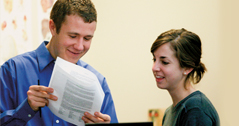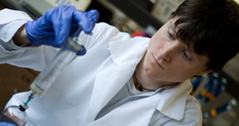Administration
Dean: William K. Lobb, D.D.S., M.S., M.P.H.
Associate Dean for Research & Graduate Studies: Arthur F. Hefti, D.D.S., Ph.D.
Program Directors
Dental Biomaterials: David Berzins, B.S., Ph.D.
Advanced Education in General Dentistry: Joseph M. Vitolo, B.S., D.M.D., M.S., Ph.D.
Endodontics: James K. Bahcall, B.S., D.M.D., M.S.
Orthodontics: Thomas G. Bradley, B.D.S., M.S.
Prosthodontics: Gerald J. Ziebert, D.D.S., M.S. & Geoffrey Thompson, B.A., D.D.S., M.S.
marquette.edu/dentistry/
Degrees Offered
Master of Science, Plan A only, with two options (see the Master’s Requirements section for details); Certificate
Specializations
Master’s: Dental Biomaterials, Endodontics, Orthodontics, Prosthodontics
Certificate: Advanced Education in General Dentistry, Endodontics, Orthodontics, Prosthodontics
Graduate Program Overview
The School of Dentistry offers graduate programs in dental biomaterials, and the ADA-accredited programs in advanced general dentistry (AEGD), endodontics, orthodontics, and prosthodontics. These programs can be modified to allow conjoint interdisciplinary graduate work to be undertaken in any other unit of the university, and a master of science or doctoral degree can be obtained through an appropriate graduate degree-granting department of the university or through the interdisciplinary Ph.D. program. Faculty for each dental graduate program are drawn both from full-time Dental School faculty and from practicing specialists in the field who serve as adjunct faculty (part-time faculty).
The AEGD program is an ADA-accredited one-year clinical program with a non-accredited two- or three-year option. Upon successful completion of all clinical and didactic requirements, a certificate is issued. There is no tuition for the 1-year program and the resident receives a generous stipend. The dental biomaterials program is a non-accredited 2-year program leading to a master’s degree and is comprised of courses from the School of Dentistry and the College of Engineering.
The specialty programs of endodontics, orthodontics and prosthodontics are clinically and research based, offering a specialty certificate and a master’s degree. Graduates are prepared to handle complex clinical cases and to work effectively with both general dentists and other dental specialists. For all the specialty programs, the master’s degree is required (certificates will not be awarded without the master’s degree). The endodontics and orthodontics programs are two-year programs and the prosthodontics program is a three-year program. Tuition for the specialty programs is charged at a flat rate (20% during the summer term, 40% during the fall term, and 40% during the spring term). Any applicable instrument or service fees are charged during the fall term each year.
Specialty Certificate Requirements
Course work requirements for each graduate specialty program (endodontics, orthodontics and prosthodontics) are determined by the director of the specific program in accordance with accreditation standards. Courses include study in basic health sciences, dental biomaterials, research methodology, clinical dental specialties and other related science disciplines, as appropriate. In addition to course work, students also must complete patient care requirements, pass a comprehensive clinical examination, and submit all required evaluation data to receive the certificate.
Prerequisites for Admission
Selection for admission is based upon the applicant’s academic standing and clinical abilities. Competitive applicants will rank high in their dental school classes, have strong clinical skills and experiences, and have some experience with research. In general, to be admitted to any of the graduate programs in clinical dentistry, the applicant must have graduated from an accredited dental school.
For the dental biomaterials program, the applicant may be either a dental school graduate or have a baccalaureate degree in science or engineering. In special cases, a student with a baccalaureate degree in another area, but who has an appropriate background, may be admitted to the dental biomaterials program.
Application Deadlines
Sept. 1
For endodontics, orthodontics, and prosthodontics programs starting in June of the following year.
Oct. 1
For first round interviews for the AEGD program starting June 1st of the following year. Applications will be accepted beyond this deadline until all available AEGD positions are filled. For information on position availability, applicants applying after Oct. 1 should call (414) 288-3323 or e-mail jacqueline.webster@marquette.edu.
Note: No official deadline exists for the dental biomaterials program. The biomaterials program may begin during the summer session or during any semester. The program director notifies admitted students regarding the starting date for their program.
Application Requirements
Applicants must submit, directly to the Graduate School:
- A completed Marquette University application form and application fee. Applicants must apply through Marquette, or they will not be considered for admission. In addition, applicants may also apply through the Postdoctoral Application Support Service (PASS) operated by the American Dental Education Association (ADEA), but it is not required. The orthodontics program does not accept PASS.
- Official transcripts from all current and previous colleges/universities except Marquette. International applicants must have course grades converted to numerical values of 4.000, 3.000, 2.000, and 1.000 or to corresponding letter grades of A, B, C, and D, respectively. Where such a conversion is not possible, an explanation of the grading system used in the foreign dental school and undergraduate institution should accompany the official English translation of the grade transcripts.
- Undergraduate and dental school grade-point averages, and class rank in dental school.
- Three letters of recommendation reflecting the applicant’s clinical and academic abilities.
- Scores from the National Board Dental Examinations, Part I and Part II. Not required from dental biomaterials applicants or from graduates of non-U.S./non-Canadian dental schools, except for AEGD applicants, for whom exam results are required.
- (For dental biomaterials applicants only) GRE scores strongly recommended (General Test only).
- (For endodontics, orthodontics and prosthodontics applicants) a curriculum vitae and a personal statement.
- (For orthodontics applicants only) registration with National Matching Service. The orthodontics program is part of the Postdoctoral Dental Matching Program. Details of this program can be obtained through the orthodontics department.
- (For international applicants only) a TOEFL score or other acceptable proof of English proficiency.
General Information
Non-Degree Students in Dentistry Courses
Normally, students with non-degree status are not permitted to enroll in dentistry courses; however, students from approved dental residency programs may enroll in dental graduate courses. Other students may be allowed to take dental graduate courses with prior approval from the School of Dentistry’s associate dean for research and graduate studies.
D.D.S./Graduate Program
The School of Dentistry, in close cooperation with the Graduate School, offers a doctor of dental surgery/graduate program which allows qualified students to take selected graduate courses while still in dental school. Interested dental students must formally apply for entrance into the program. Information is available from the associate dean for research and graduate studies in the School of Dentistry.
Once accepted into the D.D.S./graduate program, students are eligible to register for graduate courses offered by the School of Dentistry and other units of the university. To enroll in graduate courses, D.D.S./graduate program students must have written consent from course directors, the associate dean for research and graduate studies in the School of Dentistry, and the vice provost for research and dean of the Graduate School. Students must also submit a request form (available in the Graduate School office). The amount of graduate work available to students is determined by ability and progress within the D.D.S. program.
D.D.S./graduate students may seek admission to the following certificate or graduate programs offered by the School of Dentistry: dental biomaterials, endodontics, orthodontics or prosthodontics. Applications are subject to specified deadlines, and students are required to follow the normal competitive admission process. D.D.S./graduate students also may seek admission to other master’s programs such as biological sciences, education, engineering, business administration, mathematics/statistics/computer sciences, clinical psychology or public service. Upon acceptance into a master’s program, D.D.S./graduate students may formally request a transfer of completed graduate credits into the master’s program. Normally, a maximum of 12 credits may be transferred. (Transfer of credit forms are available in the Graduate School office.)
Further information about the D.D.S./graduate program can be obtained from the School of Dentistry associate dean for research and graduate studies.
Dental Graduate Didactic Core Curriculum
The Dental Graduate Didactic Core Curriculum (DENT 6001-6003) is designed to cover all didactic content areas applicable to the advanced practice of general dentistry and to each of the specialty areas of dentistry. The content areas are sequenced to present:
- material of interest for the general dentist seeking additional training beyond predoctoral dental education
- material of interest for each of the dental specialty areas
- advanced material of interest for those intending to pursue academic/research careers.
The presentations are organized to emphasize the overlapping nature of scientific foundational material and each of the dental specialties. Additionally, the presentations are designed to accommodate those students entering the program immediately after undergraduate education as well as those students returning from varying years of private dental practice. The course of study is comprised of yearly repeating content cycles (sections) within the summer session and fall/spring terms. The Dental Graduate Didactic Core Curriculum (DENT 6001-6003) is offered from 8-9 a.m. Monday–Friday. Beyond the required classes for their program, students may register for as many DENT 6001-6003 sections as they wish during their graduate education. The sections covered in DENT 6001-6003 are listed below and a detailed description of section content is maintained in the form of comprehensive section syllabi available in the School of Dentistry office of the associate dean for research and graduate studies. Students may register repeatedly for any grading period containing material of interest and are free to rotate in and out of the courses as desired to obtain sections containing such material. Repeated registration for DENT 6001-6003 is differentiated through the use of section numbers that appear on official transcripts. Examinations and credit hours are variable and are determined by selected course sections. Grades for each course section are submitted directly to the Graduate School by course instructors at the end of each term. Official transcripts will designate the specific sections completed and the credit hours associated with those sections.
The content area sections covered annually by the Graduate Didactic Core Curriculum are as follows:
- Emergency Medicine – A comprehensive review of the pathophysiology and treatment of the most common medical emergency states. Emphasis is placed on prevention, diagnosis, and patient stabilization.
- Dental Biomaterials – Physical, mechanical, chemical, biologic behavior, properties, characterization, and testing of dental biomaterials. Biocompatibility of implant materials as well as advanced clinical concepts for general dentistry.
- Advanced Prosthodontic Biomaterials – Advanced biomaterials and clinical concepts specific for prosthodontics.
- Advanced Endodontic Biomaterials – Advanced biomaterials and clinical concepts specific for endodontics.
- Advanced Orthodontic Biomaterials – Advanced biomaterials and clinical concepts specific for orthodontics.
- Interdisciplinary Periodontics – Structure/function of the periodontium. Periodontal disease and therapy as it relates to all other aspects of dentistry emphasizing surgical approaches, occlusion, splinting, and periodontic/endodontic pathosis.
- Interdisciplinary Prosthodontics – A comprehensive discussion of prosthodontic procedures as they relate to other areas of dental practice emphasizing removable complete/partial dentures, fixed partial dentures, maxillofacial prosthetics and implants.
- Advanced Prosthodontics – Advanced prosthodontic procedures emphasizing removable complete/ partial dentures, fixed partial dentures, maxillofacial prosthetics and implants.
- Interdisciplinary Endodontics – Endodontic techniques as they relate to other areas of dental practice.
- Advanced Endodontology – Advanced endodontic techniques with emphasis on sophisticated clinical procedures/surgical approaches and their rationale.
- Interdisciplinary Orthodontics – A comprehensive discussion of orthodontic techniques as they relate to other areas of dental practice emphasizing cephalometrics, biomechanics of tooth movement, and tissue response to orthodontic procedures.
- Advanced Orthodontics – Advanced orthodontic techniques emphasizing cephalometrics, biomechanics of tooth movement and tissue response to orthodontic procedures.
- Technology and Informatics – A review of the current computer-based technologies available for independent self-directed learning, research, teaching approaches, patient care and professional communication. Emphasis is placed on biomedical applications and laboratory exercises are included to reinforce didactic concepts.
- Craniofacial Growth and Development – Dental and facial growth and development from the embryonic period through adult life.
- Advanced Oral Pathology – Principles and concepts of histopathology presented through review and microscopic study of surgical material and biopsy specimens of craniofacial lesions emphasizing pathogenesis of disease and histologic diagnosis. Laboratory exercises are included to reinforce didactic concepts.
- Head/Neck Anatomy and Osteology – Systemic and regional approaches to the study of head/neck anatomy. Emphasis is placed on vasculature, musculature, innervation, lymphatic drainage, and morphology/anatomical landmarks of the various bones of the head/neck. Laboratory dissection and demonstration reinforce didactic concepts.
- Pharmacology and Pain/Anxiety Management – The pharmacology of drugs commonly used for treatment of non-dental conditions that may affect the delivery of dental care either through direct action or through interaction with drugs commonly used in dental care. Emphasizes the neurophysiology of pain, control of pain by various classes of pharmacologic agents, and the behavioral management of dental fears.
- Research Methodology/Design – A comprehensive presentation of the research process. Emphasis is placed on evaluating the literature, scientific writing, grant writing, animal/human use, ethics, and preparing abstracts, manuscripts and presentations.
- Biostatistics – A comprehensive presentation of the various aspects of statistics and statistical evaluation. Emphasis is placed on reproducibility, power, validity, precision and accuracy.
- Oral Microbiology, Infection, and Immunology – Inflammation, immunity, and oral microbiology emphasizing the mechanisms of microbial colonization and invasion, host response and pathogenesis of dental diseases.
- Pulpal/Periapical Biology and Pathology – Applied basic sciences of pulpal and periapical histology, physiology, and pathology. Emphasis is placed on preparation, diagnosis and interpretation of biopsy samples.
- Biochemistry and Physiology of Mineralized Tissues – The chemical and cellular constituents of mineralized tissues and modern methods for their study. Emphasis is placed on bone physiology and metabolism.
- Radiology and Imaging – Advanced concepts in radiology and modern imaging techniques applied to all aspects of dentistry.
- Craniomandibular Function and Disorders – Neuromuscular and occlusal physiology, diagnosis, and treatment of functional disturbances involving the craniofacial region.
- Temporomandibular Disorders in Orthodontics – Neuromuscular and occlusal physiology, diagnosis, and treatment of functional disturbances involving the temporomandibular articulation specific to orthodontics.
- Oral Physiology – Current topics in salivary function/dysfunction, gingival crevicular fluid and dentin sensitivity.
- Geriatrics/Gerontology – A comprehensive presentation of oral health care for older adults emphasizing demographics/epidemiology, specific age-related pathosis, customized treatment approaches and interdisciplinary/integrative patient management.
- Pediatrics – The special management and treatment concerns of pediatric patients emphasizing prevention and trauma.
- Inflammation and Wound Healing – Current concepts in the cell/molecular biology of inflammation and wound healing emphasizing predictable manipulation of the wound environment.
- Cell/Molecular Biology and Molecular Medicine – Current concepts in cell/molecular biology as they relate to diagnostics and treatment with emphasis on immunologic approaches and gene therapy.
- Speech Pathology – A review of the various speech pathologies emphasizing the interdisciplinary and integrative nature of treatment involving the dental professional.
- Applied Clinical Endodontic Techniques – The latest applications of new treatment techniques and methodologies as they relate to endodontics.
- Applied Clinical Orthodontic Techniques – The latest applications of new treatment techniques and methodologies as they relate to orthodontics.
- Applied Clinical Prosthodontic Techniques – The latest applications of new treatment techniques and methodologies as they relate to prosthodontics.
- Public Health/Public Service – The epidemiology of dental disease and access to care emphasizing the role of the dental professional in community health. A review of current local, state and federal programs for dental services.
- Practice Management for Prosthodontists – A review of the current business aspects of dental practice for all aspects of prosthodontics with special emphasis on solo practice, group practice, dental clinics, and community health centers/institutionalized care.
- Practice Management for Endodontists – A review of the current business aspects of dental practice for all aspects of endodontics with special emphasis on solo practice, group practice, dental clinics and community health centers/institutionalized care.
- Practice Management for Orthodontists – A review of the current business aspects of dental practice for all aspects of orthodontics with special emphasis on solo practice, group practice, dental clinics and community health centers/institutionalized care.
- Jurisprudence – A review of the current legal aspects of dental practice for all areas of dentistry emphasizing patient care, infection control and employee relations.
- Practice Ethics – A review of various ethical dilemmas in practice settings including case studies for group discussion.
- Implantology – Basic concepts for implant placement including review of relevant maxillary/mandibular anatomy, evaluation and screening of patients, augmentation considerations, surgical techniques, surgical complications/management and relevant emergency procedures.
Graduate Dentistry
Master’s Requirements
Master of science degree applicants may only be admitted to the program under Plan A, which has two options: the traditional thesis option and the publication option. In partial fulfillment of the requirements to obtain the master of science degree, all candidates must complete the biostatistics and research design and methodology sections of the graduate core curriculum with a grade of BC or above, conduct a research project on an appropriate clinical or basic science topic, and successfully defend their research project. Format and content of the public defense is determined by the advisory committee.
Candidates are encouraged to pursue research that originates in their chosen dental specialty. Research projects are selected in consultation with the graduate program directors and the associate dean for research and graduate studies. Where possible, graduate students in advanced dental specialty programs are encouraged to do clinically relevant research. Graduate students in dental biomaterials pursue the application of scientific principles to the study of dental biomaterials including relationships among compositions, physical properties, and clinical properties for dental biomaterial systems.
Graduate students who choose the thesis option will have their research and thesis preparation supervised by a primary advisor and approved by a thesis advisory committee that consists of at least three members. The publication option, in addition, culminates in the acceptance of a first author, original, peer-reviewed publication based on a research project. Selection of the publication option requires completion of a traditional thesis in the event the submitted manuscript is not accepted by the submission deadline listed in this bulletin. All graduate students are required to present their research formally.
Advanced Education in General Dentistry
The School of Dentistry offers an Advanced Education in General Dentistry program that provides clinical experiences in all phases of general dentistry. The clinical training is complemented by a graduate didactic core curriculum that provides interdisciplinary education in the specialties of dentistry, and comprehensive diagnosis and treatment planning. The AEGD program is an intensive 12-month clinical care program. The program requires successful passing of the clinical and didactic course work resulting in a certificate from the Marquette University Graduate School. No thesis is offered. Additionally, there is a non-accredited optional second year of training available. Note: Stipends are not available for the second year of training.
To qualify for an AEGD program stipend, applicants must be graduates of U.S. dental schools. Graduates of foreign dental schools must have the appropriate Visa/citizenship status (i.e. F-1, Permanent Resident or U.S. citizen) to qualify for a stipend.
Applicants must take and submit scores from Part I and Part II of the National Board Dental Examinations. Graduates of foreign dental schools must have taken and submitted their passing scores for Part I National Boards. While Part II Board scores are not an absolute requirement for foreign trained candidates it is strongly advised to have taken the exam and submit scores to make the application more competitive.
A student in the dental biomaterials program must complete a minimum of 30 credit hours of course work, consisting of a curriculum of graduate dental biomaterials courses (24 credits) and six credit hours of thesis work. The dental biomaterials graduate program is an interdisciplinary program covering principles of materials science, engineering, chemistry, physics, biology, and dentistry. Satisfactory completion of the didactic and research components of the program results in a master’s degree through the Marquette University Graduate School. In addition to the courses offered by the School of Dentistry (described in detail under the Dental Biomaterials course description section of this bulletin), master’s candidates may be required by their program adviser to select courses offered through the Department of Mathematics, Statistics and Computer Science or other departments. Elective courses in appropriate areas such as the dental graduate core curriculum (from the School of Dentistry) or materials science (from the College of Engineering) may also be selected according to the backgrounds and interests of the individual students.
A student in the endodontics program must complete a minimum of 30 credit hours of course work, including four credit hours in clinical practice per academic year (a total of eight credit hours for each program) and six credit hours of thesis work. The remaining credits may be divided among courses specific to the specialty discipline and elective courses. The endodontics program requires two full years of patient care. Satisfactory completion of the didactic and clinical components of the programs results in a specialty certificate through the Marquette University Graduate School. Satisfactory completion of the research component of the programs results in a master’s degree through the Marquette University Graduate School. The master’s degree is required in order to receive the specialty certificate.
A student in the orthodontics program must complete a minimum of 30 credit hours of course work, including four credit hours in clinical practice per academic year (a total of eight credit hours for each program) and six credit hours of thesis work. The remaining credits may be divided among courses specific to the specialty discipline and elective courses. The orthodontics program requires 26.5 months of patient care. Satisfactory completion of the didactic and clinical components of the programs results in a specialty certificate through the Marquette University Graduate School. Satisfactory completion of the research component of the programs results in a master’s degree through the Marquette University Graduate School. The master’s degree is required in order to receive the specialty certificate.
The prosthodontic program is a three-year program. A student in the prosthodontic program must complete a minimum of 42 credit hours of course work, including 12 credit hours of clinical practice, and six credit hours of thesis work. The remaining credits will be from courses assigned by the program director. The prosthodontics program requires three full years of patient care. Satisfactory completion of the didactic and clinical components of the program results in a specialty certificate through the Marquette University Graduate School. Satisfactory completion of the research component of the program results in a master’s degree through the Marquette University Graduate School. The master’s degree is required in order to receive the specialty certificate.
On this page
- Degrees Offered
- Specializations
- Graduate Program Overview
- Specialty Certificate Requirements
- Prerequisites for Admission
- Application Deadlines
- Application Requirements
- General Information
- Non-Degree Students in Dentistry Courses
- D.D.S./Graduate Program
- Dental Graduate Didactic Core Curriculum
- Graduate Dentistry
- Master’s Requirements
- Adv Education in General Dent Courses
- Dental Biomaterials Courses
- Dentistry Courses
Graduate School Programs
- Biological Sciences
- Chemistry
- Clinical Psychology
- Clinical and Translational Rehabilitation Health Science
- Communication
- Counselor Education and Counseling Psychology
- Dentistry
- Education
- Educational Policy and Leadership
- Engineering
- English
- Foreign Languages and Literatures
- Graduate Professional Studies
- Graduate School
- History
- Interdisciplinary Ph.D.
- International Affairs
- Mathematics, Statistics and Computer Science
- Nursing
- Philosophy
- Physical Therapy
- Physician Assistant Studies
- Physics
- Political Science
- Religious Studies
- Social and Cultural Sciences
- Speech-Language Pathology
- Theology
- Transfusion Medicine




 Warning:
Warning:








